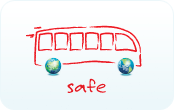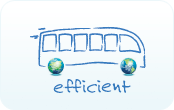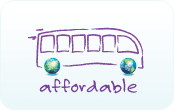 |  |  |  |  |
|





|
BRT Cleans the Air and Saves Commute Time in Mexico City and IstanbulThe international transportation policy group EMBARQ highlights the benefits of bus rapid transit (BRT) systems in Mexico City and Istanbul following the outcome of the organization’s recent report - Social, Environmental and Economic Impacts of BRT Systems.
BRT can be particularly useful in developing countries because it can bring (or extend) many of the benefits of rail transit systems – speed, predictability, priority, comfort – while requiring considerably less capital investment. The key to success is assigning dedicated travel lanes to the BRT vehicles so they avoid congestion, and committing to modern stations at appropriate intervals with streamlined fare collection and boarding.
Nine hundred thousand passengers per day ride the Mexico City BRT, which supplements the city’s Metro rail system. EMBARQ says BRT has reduced accidents and air emissions, including reductions of 690 tons of nitrogen oxide, 2.8 tons of fine particulate matter, 144 tons of hydrocarbons and 80,000 tons of carbon dioxide annually, compared to previous levels. BRT has also improved mobility on bus routes by 50 percent, reduced accidents by 30 percent and shifted an estimated 6 percent of travelers from private vehicles to public transport, says the group’s report.
In Istanbul, EMBARQ says that the average passenger on Metrobüs saves 28 workdays per year in reduced travel times compared to alternative forms of transport; the line uses dedicated space in the median of the city’s D100 freeway and operates at near-highway speeds. Bridging Asia and Europe, Istanbul’s system is the first BRT in the world to provide intercontinental service. The system serves 600,000 passengers daily.
|

